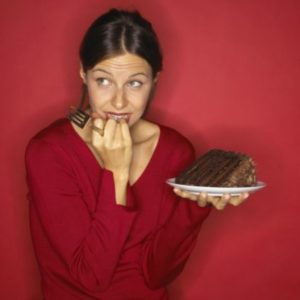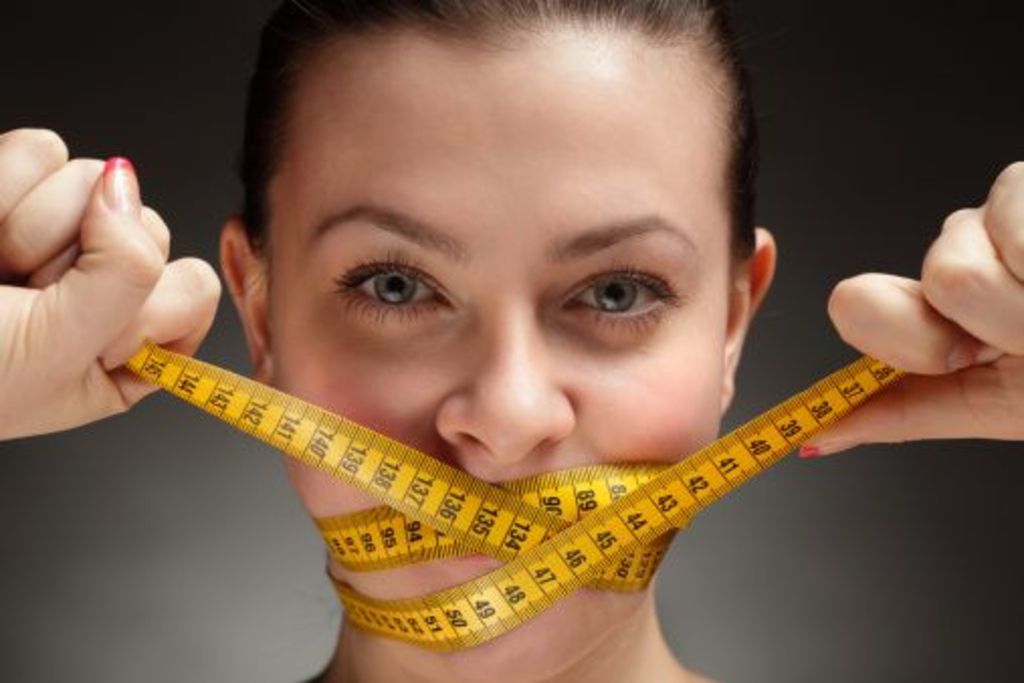“Low-Cal Cocktails to Sip Guilt-Free!” “No-Guilt Snacks” “Guilt-Free Ice Cream!” “Easy Guilt-Free Pasta Dishes” 
Notice how you will never find headlines like this on the covers of fitness magazines geared toward men. Yet, many women’s magazines rely on this selling tactic to push subscriptions. Why, ladies, are we our own worst enemy? Furthermore, when did Catholicism begin interfering with our obsession with dieting?
Now, I don’t want to suggest that only we women suffer from these feelings of inadequacies and that men are off the hook. In fact, a website dedicated to the education and support of those who suffer from eating disorders states that 10 to 15 percent of anorexia and bulimia sufferers are male. Feelings of shame with regards to our diet can be traced back to one basic philosophy: that there are “good” foods and there are “bad” foods. If you eat mostly “good” foods you must be good, right? But, if you harbor a sinister, immoral, Satan-inspired taste for forbidden foods, you are bad. Very bad.
Published in the American Journal of Orthopsychiatry, author Emily S. Frank Ed.D. writes that, “Women with eating disorders experience more shame and guilt in relation to eating than do either normal or depressed women, and that such shame and guilt differentiate the eating disorders from other psychopathology.” This cycle of misguided information and inevitable destructive behavior begins at an early age. An article published in a U.K. paper reports that, “Some 40 percent of girls aged 11 to 15 have some guilt about what they eat and are often on diets as a result.” Who do you think influences such behaviors and feelings of insecurity? Of course, the media and pop culture bear a portion of the responsibility, but healthy body image and a healthy relationship with food starts at home.
Let’s turn the tables and find balance in our quest for self-acceptance and our primal desire for pleasure and satiety.
- Consider your priorities. Determine what foods you simply cannot live without. We all have them: pizza, chocolate, beer, –ahem– jelly beans. It might be helpful to write these foods down so that you can better understand the reasons you feel they are important. This is a quality-of-life issue, and if you feel an associated guilt response to any of them, dig deeper. Depriving yourself of foods that you truly enjoy will eventually lead to failure.
- It’s never too late to change your mind. Bought a cupcake on an impulse while shopping for dinner? It happens. All I’m asking is that you re-evaluate once you taste it. If you feel the slightest bit disappointed, spit it out. Throw the rest away. Oftentimes the fantasy in our mind of how something will taste differs from the reality. Make sure that your indulgences count — otherwise, you will continue to chase that craving.
- Don’t give in to “obligatory” calories. Just because it’s a coworker’s birthday doesn’t mean you are under contract to have a piece of cheap, flavorless cake. Guess what? It’s always someone’s birthday. Or holiday. Or celebration for who-knows-what-accomplishment. Everyone is meeting for happy-hour? Those calories add up, too. Empower yourself to pass on foods you wouldn’t want under normal circumstances. Peer pressure can be a mother, so be discreet if you must. Get creative. Slip over to the bar and order yourself a soda water with lime. Nobody will know that you don’t have some vodka in there. Cleverly stumble near the trashcan and allow your plate of hors d’oeuvres to fall in. Bye-bye, wasteful calories.
- Keep a food journal. I’m not asking that you broadcast your daily intake, but if you keep track of what you eat and when, you just might identify unhealthy eating patterns — late-night snacking, rush-hour drive-thru, morning-after-girls’-night-feasts. Knowing the “why” is half of the battle.
- Admit that you’re human. The other day I realized that my bag of Twizzlers was empty. Then I realized I had opened it only a few hours earlier. Not my healthiest grazing performance, but it doesn’t happen often. Cut yourself some slack. Understanding that an occasional dietary mishap doesn’t define you as a person allows you to process, accept, and move forward. Forgive yourself and get back on track.
A surefire way for any of us to sabotage our efforts of “clean” or “healthy” eating is to introduce guilt. Most of us create problems that don’t even exist, in spite of the barrage of messages suggesting otherwise on the covers of our favorite magazines. Establish your own rules with respect to your body and health. Love yourself. Fuel your body and your soul. The Vatican can keep their guilt. 
Jodilyn Stuart is the Health & Sports Senior Staff Writer for 303 Magazine, owner of ModaBody Fitness, and has been a professional fitness geek since 1997. If you have questions, feel free to email at: Jodilyn@303Magazine.com *Vote for Jodilyn as Denver’s A-List top trainer here*


